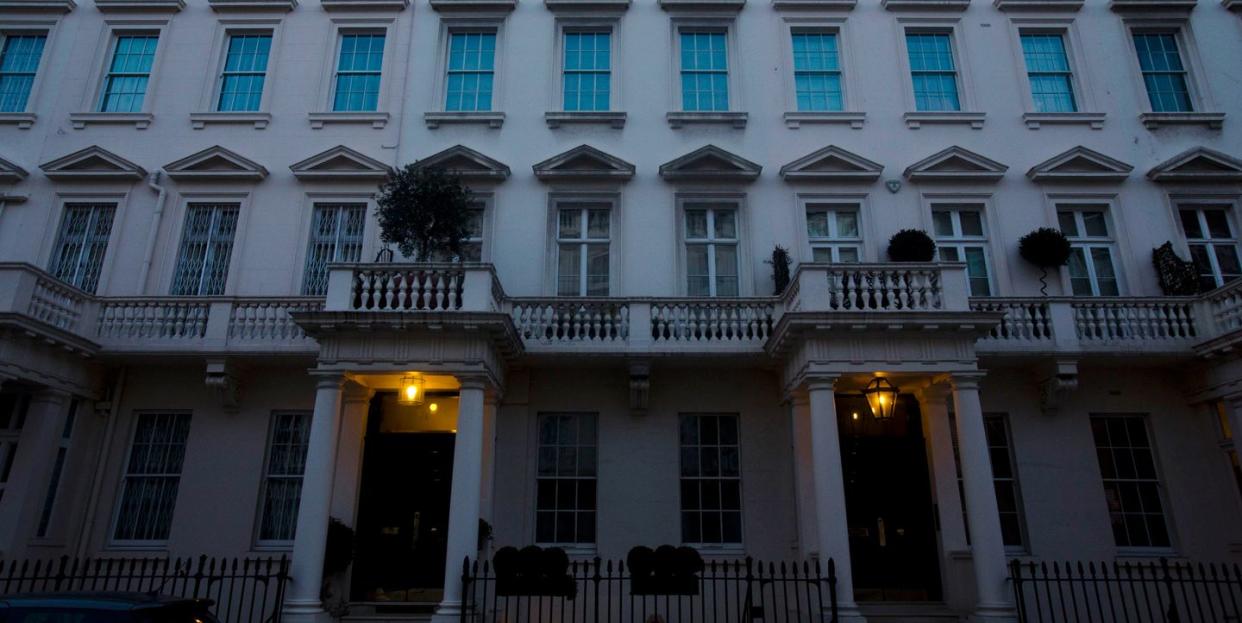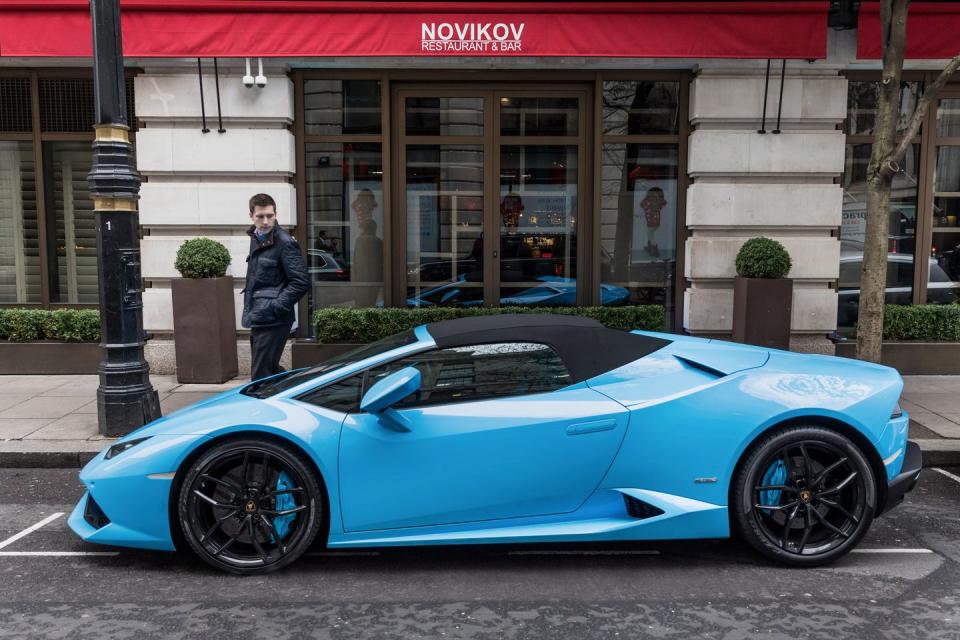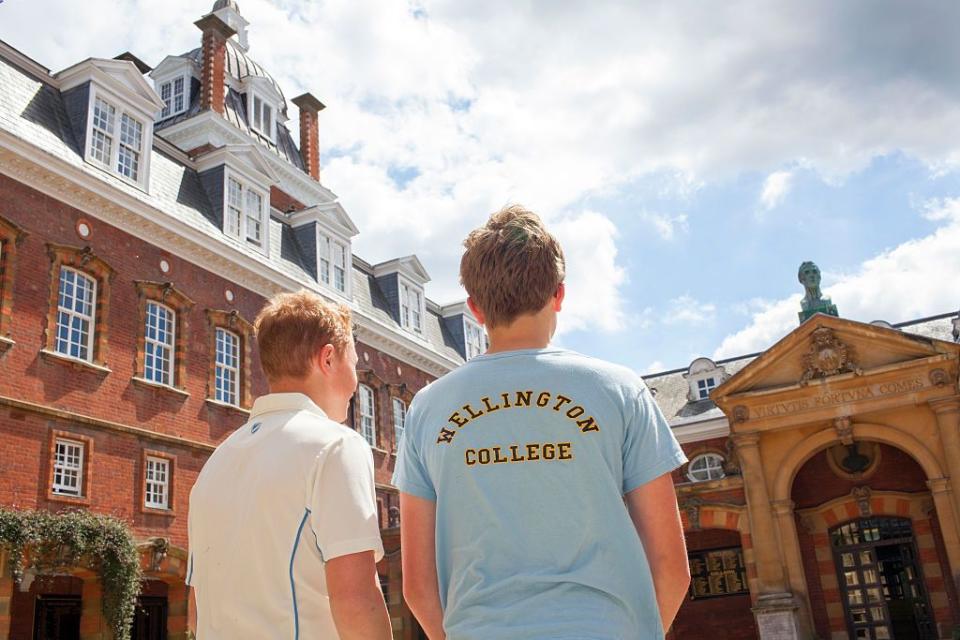The Siege of Londongrad

- Oops!Something went wrong.Please try again later.
- Oops!Something went wrong.Please try again later.
It’s easy to predict what the smartly dressed concierge will say when I ask if Polina Kovaleva is at home. It’s a sunny Friday morning in April at a luxury apartment building in Kensington. Kovaleva, who is 26, bought a ground floor flat here for $5.5 million in cash in 2016, despite being a student at the time with no obvious source for such funds.
Poised between Holland Park and Kensington High Street, the development, which includes a basement swimming pool and a cinema, sits just opposite London’s first cryotherapy spa. Now it’s Kovaleva’s gilded lifestyle that has been frozen, and the arresting blonde, who once broadcast her jetsetting ways on Instagram, appears to have gone into hiding.
“I’m afraid I am unable to comment,” the stony-faced concierge says without hesitation. I am not the first person to come looking for the Russian here.
Days before my visit, Kovaleva was sanctioned by the UK government after her links to the Putin regime were exposed. The Anti-Corruption Foundation, run by the jailed Russian opposition leader Alexei Navalny, had revealed a romantic and financial relationship between Kovaleva’s mother, Svetlana Polyakova, and Sergei Lavrov, Putin’s warmongering foreign minister.
Kovaleva had clearly not anticipated current events. Not only had she bought the flat in her own name, she did little to conceal her whereabouts on her now deleted Instagram account. The megayacht and lavish Montenegrin villa she frequently used as selfie backdrops belonged to Oleg Deripaska, the notorious Russian oligarch and Lavrov confidant, who has also been sanctioned.

In the tumultuous weeks following Russia’s invasion of Ukraine, the now elusive Kovaleva has emerged as a symbol of London’s embrace of Russian money. For most of this century, rich Russians have thrown bundles of cash at London’s schools, law firms, private members clubs, and “superprime” apartments and mansions.
And the city held out its arms, becoming known as “Londongrad” thanks to high-rolling clusters of Russians in the leafy environs of Hampstead and Kensington, as well as the central London squares of Mayfair and Belgravia. Now, as dozens of Russians burned by association with Putin navigate asset freezes, a city is asking itself how the party started—and whether the music has stopped.
Russians were once a rare species in London. “There were about 50 here when I came in 1983,” says Irina Shumovitch, who, after fleeing the Soviet Union as a stowaway on a ship, became a teacher and BBC radio producer. Then, after the collapse of the USSR, the emerging oligarchs began to look west for safe places to invest and enjoy their sudden riches. In 1994 the UK government introduced “golden visas.” Anyone who could invest at least $1.3 million in the UK—later increased to $2.6 million—could make a home here, no questions asked.
Russian money began to trickle in, until one man triggered a flood. In 2003 Roman Abramovich, an oil magnate and Putin ally, bought Chelsea Football Club for a reported $195 million. “A particularly well-informed businessman told me it was the cheapest insurance policy in history,” says Dominic Midgley, co-author of Abramovich: The Billionaire from Nowhere, published in 2004. “It conferred upon him immediate celebrity and meant that he was basically immune if Putin ever turned against him.”
Abramovich, who was 36 when he bought Chelsea, could have been discreet about his wealth. After all, London was hardly a stranger to foreign money. But that was not the way among the nouveau elite of Russian billionaires, who had grown up with nothing under communism. Instead, Abramovich became a master of conspicuous consumption, raising the bar for the other oligarchs. “His righthand man told me that he takes the view that you can’t take it with you,” says Midgley, who recalls an aide to Abramovich once ordering $1,500 of sushi from a Nobu restaurant in London and flying it by private jet to a meeting in Azerbaijan.
“It was shocking to see how eagerly uncouth stolen wealth was embraced here,” Shumovitch says. She wasn’t alone in her incredulity. Tatiana Fokina, the daughter of academics from Leningrad (now St. Petersburg), moved to London in 2000 after falling in love with an Englishman of modest means. “I couldn’t believe the amount of wealth there was, the entourages, the parties, and the notorious bad taste,” she recalls.
Russian wealth gave rise to an entire service industry: the butlers, chefs, polo instructors, and gunsmiths who began to circle the arrivistes. One veteran boss of a concierge company recalls a client who would frequently rack up five-figure restaurant bills on consecutive nights. Then, of course, there were the obsequious lawyers and bankers who helped guard fortunes and reputations.
Fokina, who is now 35, capitalized on the phenomenon too: She got a job at a Notting Hill real estate agency and then as a personal assistant to a wealthy Russian. He would ask her to arrange celeb-studded parties for 400 people on an Italian island—and demanded letters of apology if she made the slightest mistake.
Above all else, Russian money supercharged London’s property market. Kovaleva’s Kensington apartment is a relative rabbit hutch. In 2009 Abramovich spent $112 million on a 15-bedroom pile on Kensington Palace Gardens, a half-mile gated avenue known as Billionaire’s Row. When I walk past it, a blue Tesla is charging in the driveway, but there are no other signs of life. (Abramovich, who was himself sanctioned in March, is thought to be out of the country.)

Marc von Grundherr, a central London real estate agent, tells me about a Russian woman who returned to a realtor’s office in Hampstead with her husband two days after viewing a property near the Bishops Avenue in North London, another billionaire’s row. The couple wanted to pay the asking price. “Perfect!” the agent said, Grundherr recalls. “The guy turned around and waved at someone in the car, who walked in with two massive suitcases containing £5 million in cash. They wanted to move in that afternoon. The agent almost wet himself and had to explain that that’s not quite how we do things here.”
The embrace of rubles came from the top. As mayor of London, Boris Johnson, the man now sanctioning oligarchs, boasted at a real estate conference in Mayfair in 2014 that “London is to the billionaire as the jungles of Sumatra are to the orangutan: We are their natural habitat.” But perhaps more even than London’s mansions and Michelin-starred restaurants, England’s schools were a magnet for new Russian money.
Kovaleva arrived in London, at age 16, to study at Clifton College. Fees at the private boarding school in Bristol are more than $50,000 a year, and the facilities include a 320-seat theater named after former pupil Sir Michael Redgrave, of the acting dynasty.
Despite her misgivings about her spendthrift compatriots, Shumovitch became an education consultant. For a fee, well-connected go-betweens like her would help little Evgeny or Sofia navigate entrance exams and waiting lists. As ever, money talked. “Parents began building auditoriums and pavilions and writing massive checks,” Shumovitch says.

Alexander Nikitich, founder of the Carfax Education Group consultancy, remembers a meeting with the development director of a school that had become notorious for courting rubles. The man asked Nikitich to alert him to any wealthy new Russian clients he had, bypassing the school’s admissions office with a crude code. “He told me to give him a call and say, ‘I have some caviar for you,’ ” Nikitich says.
Stories abounded of impeccably groomed Russian teenagers augmenting austere boarding school wardrobes with Chanel and Louis Vuitton. Helipads were installed on manicured grounds. Abramovich’s daughter Arina (he has four) reportedly flew by helicopter to her West London school when she wasn’t staying at the big house in Kensington.
But while these schools offered facilities and a standard of education that could not be found in Russia, the oligarch class was unwittingly raising a new generation of freer, more modest Russians. “A liberal education gave them a completely different mindset,” Shumovitch says. “The younger Russians became more tolerant, more questioning. They would go back to Russia and try to steer it in a different direction. I always thought, What a brilliant way to use all that oil and gas money.”
But the party started to stall. The truth is that Putin had begun to turn the music down in London long before the Ukraine invasion. Despite the president’s own reported fondness for lavish mansions and megayachts, all that liberal decadence in Londongrad was becoming a threat. Nikitich recalls a drop in school enrollments after Russia annexed Crimea in 2014, the invasion having cooled relations between Moscow and London. The freeze set in further as Putin stood accused of attempting to influence the 2016 Brexit vote and, in 2018, of poisoning a Russian double agent in the English town of Salisbury.
Patriotic billionaires began to invest in Russian schools, as Moscow made noises about the summoning home of students and capital from places like London. Even the flashy arrivistes who stayed in England began to calm down—they were getting older, after all. New Russian buyers became less dominant in the superprime property market, and their offspring set out on different paths.

Just around the corner from Kovaleva’s Kensington flat, I gawk at a stuccoed mansion on Upper Phillimore Gardens, where homes have sold for as much as $100 million. Pharaoh hounds guard the entrance, and the silk window blinds are drawn tight. This pile reportedly belongs to Elena Baturina, a construction magnate who was until recently Russia’s richest woman.
Baturina, who has not been sanctioned, and her husband Yuri Luzhkov sent their children to London to finish their educations when Luzhkov’s removal as mayor of Moscow threatened their empire (Luzhkov died in 2019). Their daughter Elena Luzhkova perhaps epitomizes the new generation. Her Instagram feed could be that of any 30-year-old in the city. But for a shot of Halloween pumpkins on the steps of the Kensington house (Baturina peeks out from behind the front door), it’s all low-key selfies and countryside walks. After studying at University College London, Luzhkova opened Yeda, an unassuming vegan café not far from Covent Garden (it shut down during the pandemic).
“The new generation are completely different,” says Fokina. “These are the kids who wear blue jeans and white T-shirts and will not ask their parents for a flashy car. They are thinking about different things.”
After her own modest start in London, Fokina married up. After quitting her personal assistant job, she met Evgeny Chichvarkin, an exiled billionaire cell phone tycoon and long-standing Putin critic. The couple, who now live with their six-year-old daughter in a Chelsea townhouse, opened Hedonism Wines in Mayfair and the Michelin-starred Hide restaurant nearby. “I could be a Cinderella,” Fokina says of her journey, laughing. “But my life’s mission is to make sure that our daughter understands that everything we have is by hard work.”
It’s not clear where Polina Kovaleva fits into the generational dynamic. After leaving Clifton College she studied economics and politics at Loughborough University before getting a job at Gazprom, the Russian oil and gas giant. In 2018 she studied for a master’s at Imperial College’s business school, a short walk from her flat. She was swiftly snapped up by Glencore, the Anglo-Swiss commodities trader.
Evidence of a work ethic, then, and some economic know-how. But Kovaleva’s Instagram account was a stereotypically showy Russian-in-London affair. In any case, as for so many of her compatriots in the city, a party that had already peaked by 2014 is surely now over. “I don’t see how there’s any prospect of London regaining its role as the central repository for oligarchs’ wealth,” says Oliver Bullough, author of a timely new book, Butler to the World, which details Britain’s embrace of foreign money.

Kovaleva is not the only sanctioned Russian to have all but disappeared. It’s not even known if she is still in the UK. Those who have spoken out about their new situation have struggled to inspire sympathy. “Will I be allowed to have a cleaner, or a driver?” billionaire businessman Petr Aven asked the Financial Times after his assets were frozen.
“I can’t even take anyone out to a restaurant,” Aven’s business partner Mikhail Fridman told a Spanish newspaper. Fridman said the UK authorities were allowing him only enough funds to buy essentials, such as food. He described being “practically under house arrest”—in a neo-gothic Hampstead mansion with grounds inspired by Versailles that he bought in 2016 for $80 million.
Real estate agents tell me that while Russians are not yet selling up, they ceased to be major buyers some years ago. There is no shortage of cash from elsewhere; nobody I speak to sees any threat to the city’s 0.1-percent economy. Lee Koffman, an agent at Sotheby’s International Realty, says buyers from the Far East are circling Russian-owned homes in anticipation of a superprime fire sale, something he does not foresee. “They’re just keeping their heads down,” he says of the Russians.
Russians in London without links to Putin, most of whom despise their president, have been damaged by association. Fokina, who with her husband has sent medical supplies to Ukrainian refugees, was skiing in St. Moritz in February when a stranger on a chairlift raised his eyebrows at the mere mention that she was Russian. “I took my daughter into school the morning after the invasion and just felt so ashamed,” she says.
Public resentment has boiled over at certain addresses. On Belgrave Square, near Knightsbridge, squatters occupied an empty six-story house owned by Oleg Deripaska before being thrown out and arrested by police. When I stroll by a few days later, a reinforced steel door has been hastily installed.
They also came to Kensington. The week before the government sanctioned Kovaleva, a small crowd gathered outside her building. “Your father is a murderer!” they cried. Their placards included a photo taken from Kovaleva’s now deleted Imperial College profile page, which included a brief Q&A. “You learn a lot about cultural awareness and how different people approach work based on their background,” she said of her schooling. For Kovaleva that lesson would not end with her graduation.
This story appears in the Summer 2022 issue of Town & Country. SUBSCRIBE NOW
You Might Also Like

